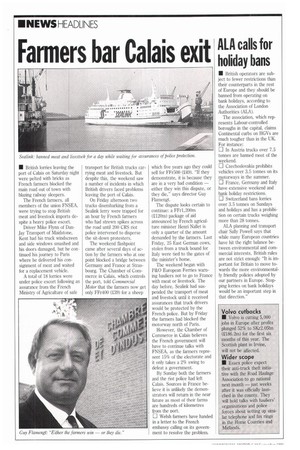Farmers bar Calais exit t i t iolcay l ba f nosr
Page 8

If you've noticed an error in this article please click here to report it so we can fix it.
• British lorries leaving the port of Calais on Saturday night were pelted with bricks as French farmers blocked the main road out of town with blazing railway sleepers.
The French farmers, all members of the union FNSEA, were trying to stop British meat and livestock imports despite a heavy police escort.
Driver Mike Flynn of DanJay Transport of Maidstone, Kent had his truck windscreen and side windows smashed and his doors damaged, but he continued his journey to Paris where he delivered his consignment of meat and waited for a replacement vehicle.
A total of 18 lorries were under police escort following an assurance from the French Ministry of Agriculture of safe transport for British trucks carrying meat and livestock. But despite this, the weekend saw a number of incidents in which British drivers faced problems leaving the port of Calais.
On Friday afternoon two trucks disembarking from a Sealink ferry were trapped for an hour by French farmers who had strewn spikes across the road until 200 CRS riot police intervened to disperse the sit-down protesters.
The weekend flashpoint came after several days of action by the farmers who at one point blocked a bridge between Germany and France at Strasbourg. The Chamber of Commerce in Calais, which controls the port, told Commercial Motor that the farmers now get only FFr400 (E39) for a sheep
which five years ago they could sell for FFr500 (49). "If they demonstrate, it is because they are in a very bad condition — either they win this dispute, or they die," says director Guy Flamengt.
The dispute looks certain to continue: a FFr1,200m (2120m) package of aid announced by French agriculture minister Henri Nallet is only a quarter of the amount demanded by the farmers. Last Friday, 25 East German cows, stolen from a truck bound for Italy were tied to the gates of the minister's home.
The weekend began with P&O European Ferries warning hauliers not to go to France with meat or livestock. The day before, Sealink had suspended the transport of meat and livestock until it received assurances that truck drivers would be protected by the French police. But by Friday the farmers had blocked the motorway north of Paris.
However, the Chamber of Commerce in Calais believes the French government will have to continue talks with FNSEA, as the farmers represent 15% of the electorate and it only takes a 2% swing to defeat a government.
By Sunday both the farmers and the riot police had left Calais. Sources in France believe it is unlikely the demonstrators will return in the near future as most of their farms are hundreds of kilometres from the port.
0 Welsh farmers have handed in a letter to the French embassy calling on its government to resolve the problem.
IN British operators are subject to fewer restrictions than their counterparts in the rest of Europe and they should be banned from operating on bank holidays, according to the Association of London Authorities (ALA).
The association, which represents Labour-controlled boroughs in the capital, claims Continental curbs on HGVs are much tougher than in the UK. For instance: El In Austria trucks over 7.5 tonnes are banned most of the weekend.
O Czechoslovakia prohibits vehicles over 3.5 tonnes on its motorways in the summer. • France, Germany and Italy
have extensive weekend and bank holiday restrictions. LI Switzerland bans lorries over 3.5 tonnes on Sundays and holidays and has a prohibition on certain trucks weighing more than 28 tonnes.
ALA planning and transport chair Sally Powell says that while many European countries have hit the right balance between environmental and commercial interests, British rules are not strict enough: "It is important for Britain to move towards the more environmentally friendly policies adopted by our partners in Europe. Stopping lorries on bank holidays would be an important step in that direction."




























































































































